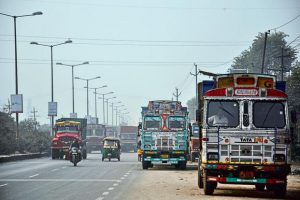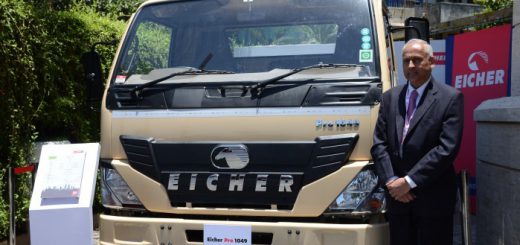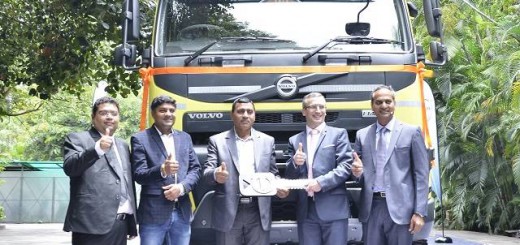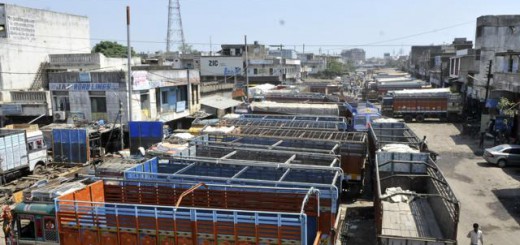Truck sales face temporary dip as transporters await clarity on GST
Truck sales are likely to suffer in the short term as transporters await more clarity on the goods and services tax (GST) implementation before placing new orders. In the long run, the structure of the truck market might change as demand shifts to higher tonnage vehicles and smaller trucks for last-mile delivery, shrinking the middle of the market, analysts said.
As GST promises to bring greater efficiency at state border checkpoints, truckers say that they will be able to improve utilisation levels as waiting time gets reduced. On average, Indian trucks travel 250km a day, about one-third the global average.

As GST promises to bring greater efficiency at state border checkpoints, truckers say that they will be able to improve utilization levels as waiting time gets reduced.
Efficiency is set to improve after GST kicks in, said Rajeev Pratap Singh, partner and head of the automotive sector practice at consulting firm KPMG. This, he added, will mean deployment of fewer but higher tonnage trucks and smaller trucks for feeder services. Thus, the market will move further towards vehicles above 16 tonnes and those below 5 tonnes.
GST is likely to boost India’s gross domestic product by 2 percentage points, according to finance minister Arun Jaitley. That would tend to increase the overall demand for goods and will boost the trucking industry as well. But that demand will trickle in after the new tax is implemented.
In the near term, GST adds a bit of uncertainty to the already beleaguered truck market. After expanding briskly for nearly two years, sales of medium and heavy-duty trucks have been moderating for the last two months as replacement demand, one of the key drivers of growth so far, has started to wear off.
Weak freight rates and lower demand for cargo trucks too have dented volumes. Sales advanced by a mere 1.5% to 11,923 units in the June quarter, according to the Society of Indian Automobile Manufacturers (Siam).
A 29 July Citi Research report said pace of activity indicators had slackened in the first quarter of fiscal 2016-17, from the substantial pickup witnessed in the fourth quarter of fiscal 2015-16.
Sales could take a further hit over the next six to eight months as transporters review fleet expansion plans.
“As it is we are seeing a slowdown in demand and now after the GST, buying a new truck is the last thing on a transporter’s mind,” said Bhim Wadhwa, president of the All India Motor Transport Congress (AIMTC), the apex body for road transporters.
Wadhwa’s firm Okara Roadlines has a fleet of 350 trucks, of which 40% are idling as the supply of trucks in the market is far more than the actual demand.
Wadhwa and his peers in the road transport industry are also upset about diesel and petroleum being left out of GST’s purview.
“This means that we cannot claim any tax credit on the costs incurred in diesel purchase and we will continue to suffer,” said Mahendra Arya, a Mumbai-based transporter. Three out of ten rupees earned by a trucker is spent on diesel.
Truck makers, however, remained guarded on the impact of GST on sales.
“While it is too early to comment on the actual impact on CV (commercial vehicle) sales, we do welcome the passage of the forward-looking reform, which will augur well in the long term for uniform economic progress across the country,” said Ravi Pisharody, executive director, commercial vehicles, at Tata Motors Ltd.
Executives at Ashok Leyland Ltd, Volvo Ltd and Eicher Motors Ltd didn’t respond to calls and text messages seeking comment.
Truck firms’ hopes of a sales pickup in October, ahead of a switch to stricter emission norms from April 2017 and the festive season, may not be fulfilled.
An implementation of the stricter Bharat Stage IV norms of emission from April 2017 is set to make trucks dearer by up to Rs.1.5 lakh to Rs.2 lakh depending on the load carrying capacity.
“I would rather wait till there’s clarity on GST reform and spend more later, instead of buying a new truck this year,” said N.L. Gupta, proprietor of Mumbai-based Caravan Roadways.
Source: http://goo.gl/nl4HxP




Recent Comments